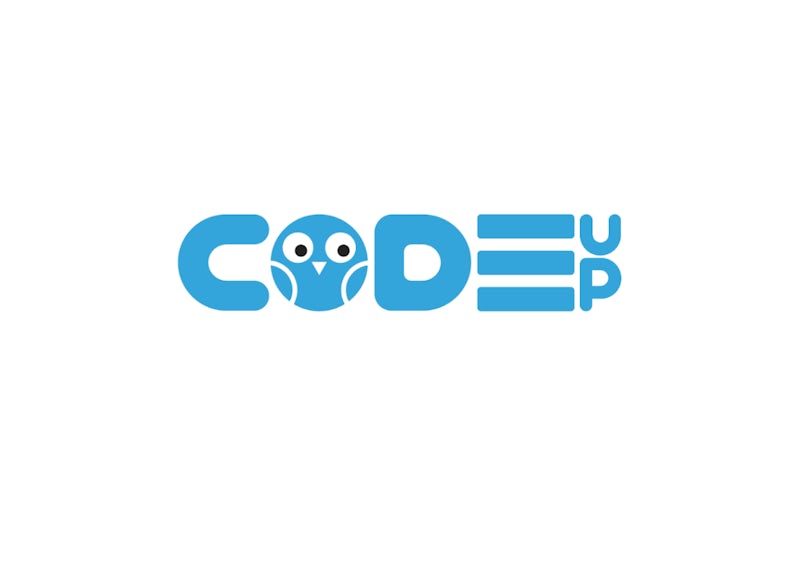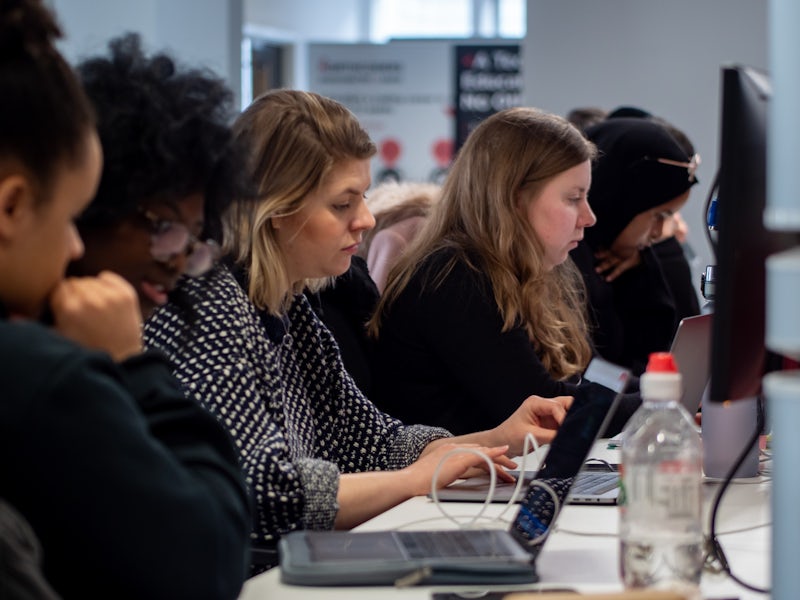You don’t need to study computer programming at uni to get your foot on the coding career ladder. With the right help, training and support, you could go from absolute beginner to junior engineer in as little as 13 weeks — no qualifications required. Here’s how…

For those pursuing a career in software development, the future looks bright. Not only do jobs requiring digital tech skills command higher salaries, with an average salary of £42,578, compared to £32,477 for those without digital tech skills, but companies are actively searching for (and struggling to find) talented developers to fill their roles. In fact, positions are opening up faster than they can be filled, meaning that people with the right digital skills are in high demand.
Here are three ways you can pick up coding skills and take steps towards a career in programming without a degree.
1. Upskill online
Weighing up your career options without a degree? With so many fantastic coding resources available for beginners online, from video tutorials and vlogs to blogs and even podcasts — it has never been easier for beginners to brush up on the basics.
If you’re just starting out, we recommend you take a look at freeCodeCamp’s JavaScript Basics. Looking for something slightly more in depth? It’s well worth signing up for Treehouse, an online school with courses aimed at beginners looking to learn coding skills for a career in the tech industry. For £20 per month, you can access hundreds of online tutorials and guides.
Free resources are also a great way to dip your toe into the world of coding before committing to a course or a bootcamp. They allow you to pick up the very basics of software development, giving you the opportunity to test if this is the right career path for you without making a financial commitment. Of course, self-lead online learning isn’t for everyone, but it is an important part of your research and ultimately, your coding journey.
Upskilling 101: Don’t give up if the first resource you turn to doesn’t work for you. Everyone learns differently, so if freeCodeCamp isn’t your thing, don’t get frustrated, keep your eyes open for alternatives. There are plenty of online resources for you to choose from, with new platforms popping up all the time.
2. Look for coding meetups in your area

We’ve all had to start from scratch at some point. One thing’s for sure: it’s always easier to dive into something new when you have a bit of support and encouragement.
Coding meetups are perfect for connecting with your local coding community. CodeUpUK hold monthly meetups across the UK, including Leeds and Manchester. The events are run by volunteers who are passionate about helping others to develop their programming skills. If you’re unsure about pursuing a career as a software engineer, it’s well worth going along and asking for advice from members who have worked in tech for years. They’ll be able to give you their honest opinion on the realities of a career in the industry. You can also use sites like Eventbrite and Meetup to find other coding meet ups in your area, and a little bit of online searching will likely throw groups around you too. No matter where you are located in the UK, it’s highly unlikely that you won’t find an enthusiastic group of coders to help you on your journey!
Coding meetups 101: Don’t be afraid to ask questions. Coding meetups attract people of all skill levels, from complete beginners to developers with 20+ years of experience. Use that experience to your advantage and ask as many questions as you can.
3. Join a coding bootcamp

This could be the perfect option for you.
Unlike self-study and online courses where you’re left to your own devices, coding bootcamps offer an immersive, intensive education experience where you’re taught the essential programming skills you’ll need to kick-start a career as an entry-level developer.
At Northcoders, our 13-week curriculum is based on the skills businesses tell us they’re looking for, and is structured around core programming fundamentals.
Unlike universities where one tutor lectures to a large group of students and is only available for one-on-one sessions one or two days a week, our staff-to-student teaching ratio is 1:7 and every student receives support from a team of dedicated mentors. This means that there will always be someone on hand when you need help with a persistent problem or error message!
Even in the remote world, our bootcamp remains as interactive and supportive as we could possibly make it. Lectures are delivered live, allowing students to ask questions, mentee groups have their own sessions and coffee breaks, and our NC help desk ensures that you are never left waiting for an answer, or help with a problem.
Coding bootcamps 101: Don’t rush your decision and always ask coding bootcamps these questions before you apply.
To recap…
There is no perfect way to become a software engineer without a degree, but our key steps would be:
- Upskill Online
- Look for Coding Meet Ups
- Join a Coding Bootcamp
Is Northcoders an alternative to university education?
Over the years, we’ve received lots of enquiries from people who think they need to have completed their GCSEs, A-levels or have a degree-level qualification in order to secure work in software development. The truth is, there are many routes into a career in tech, and Northcoders is one of them.
You don’t need any specific qualifications to study with Northcoders. All we ask is that you pass our Entry Challenge and complete the pre-course materials we ask every student to work through before their first day on campus. Why? We want you to hit the ground running from day one, and the Entry Challenge and pre-course preparation are key to setting you up for success.
Learn to code with Northcoders
No qualifications. No committing to a three-year course at university. Just industry-leading training that will equip you with the skills employers are looking for and get you hired. Sound like something you’re interested in? Find out more about our 13-week coding bootcamps.
After you graduate…
Network or Find a Mentor
This is one that can be done before your graduation. One of the best ways that you can learn about job opportunities is through referrals and word of mouth. That’s why it’s incredibly important to build out a network of mentors and peers who can also offer their professional guidance. You can find a mentor through LinkedIn or event sites like Meetup.
Build a Portfolio
Once you’ve completed your bootcamp, a good idea is building different applications that showcase your software engineering skills. Think about the kind of position you’d like to hold within a company. Your portfolio should contain a variety of applications to let interviewers see that you can back up the skills highlighted in your resume. It is also worth including on your portfolio the different types of programming you did, whether it’s individual, pair or group projects.
Expand beyond the projects you built for your Northcoders bootcamp as well as talk about how your work on these projects impacted you to continue pursuing software engineering. Talk about how your work on different projects impacted your desire to continue pursuing software engineering. Create projects that highlight your innovation and ability to develop solutions that can benefit companies where you wish to apply.
Work with Careers Team
Our careers team will work with you from the middle of the bootcamp, focusing on the types of jobs that you want to get from your experience, how to write the perfect CV and interview skills you can learn. Working with the careers team, you will be given access to the Northcoders job board, practice your interview skills and work towards the job you want.